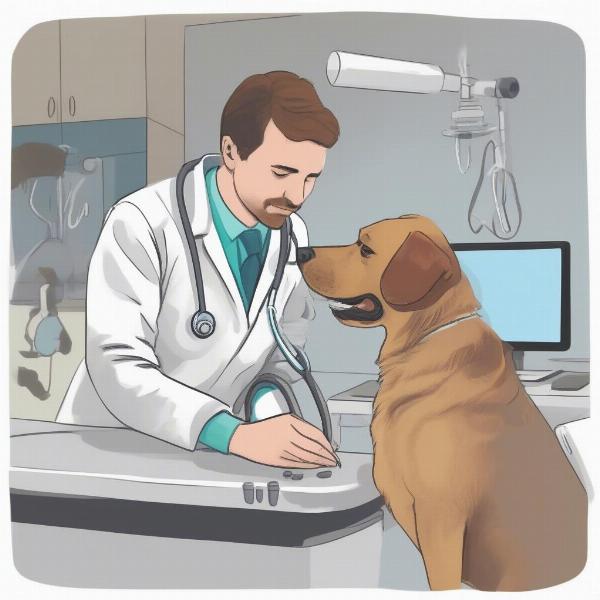If your dog is heavy panting at night, it can be concerning. Understanding why your dog is panting and when it signals a potential problem is crucial for every owner. This article will explore the various reasons behind dog heavy panting at night, from normal responses to more serious underlying health issues. We’ll also provide practical solutions to help you ensure your furry friend gets a comfortable night’s sleep.
Understanding Normal Panting vs. Problem Panting
Dogs pant to regulate their body temperature. It’s a natural process, especially after exercise or in hot weather. However, excessive panting at night, when the temperature is cooler and activity levels are lower, can indicate an underlying issue. Understanding the difference between normal panting and problem panting is essential. Normal panting is usually rhythmic and relatively shallow. Problem panting is often rapid, labored, and accompanied by other symptoms like restlessness, pacing, or whining.
Common Causes of Dog Heavy Panting at Night
Several factors can contribute to a dog’s heavy panting at night. These can range from simple environmental factors to more complex medical conditions.
Heat and Humidity
Even at night, high temperatures and humidity can make it difficult for dogs to cool down, leading to panting. Ensure your dog’s sleeping area is well-ventilated and provide access to fresh, cool water.
Anxiety or Stress
Dogs can experience anxiety or stress just like humans. Nighttime can exacerbate these feelings, leading to panting, restlessness, and pacing. Changes in routine, loud noises, or separation anxiety can all trigger anxiety in dogs.
Pain or Discomfort
If your dog is experiencing pain or discomfort, they may pant heavily at night. Arthritis, injuries, or other medical conditions can cause pain that disrupts sleep and leads to panting.
Underlying Medical Conditions
Several medical conditions can cause heavy panting at night. Heart disease, respiratory problems, Cushing’s disease, and anemia are all potential culprits. If your dog’s panting is persistent and accompanied by other symptoms, it’s crucial to consult a veterinarian.
Obesity
Overweight dogs are more prone to panting, as their bodies work harder to regulate temperature and carry extra weight. Maintaining a healthy weight for your dog through proper diet and exercise is crucial for their overall well-being.
What to Do If Your Dog Is Panting Heavily at Night
If your dog’s panting seems excessive or concerning, follow these steps:
- Assess the environment: Ensure the room is cool, well-ventilated, and quiet.
- Check for other symptoms: Look for signs of pain, discomfort, restlessness, or difficulty breathing.
- Provide fresh water: Make sure your dog has access to cool, fresh water.
- Contact your veterinarian: If the panting is persistent, severe, or accompanied by other symptoms, seek professional veterinary advice immediately.
 Vet Examining Dog
Vet Examining Dog
When is Dog Panting an Emergency?
While panting can be normal, certain signs indicate a potential emergency:
- Pale or bluish gums: This can signal a lack of oxygen.
- Rapid, shallow breathing: This can indicate respiratory distress.
- Weakness or collapse: These are signs of a serious medical condition.
- Excessive drooling or foaming at the mouth: This could be due to poisoning or other serious issues.
Conclusion
Dog heavy panting at night can have various causes, from simple environmental factors to serious medical conditions. By understanding the potential reasons and observing your dog’s behavior, you can take appropriate action to ensure their comfort and well-being. If you’re concerned about your dog’s panting, don’t hesitate to contact your veterinarian.
FAQ
- Is it normal for dogs to pant a little at night? Some panting can be normal, especially if it’s warm. However, excessive or labored panting is a cause for concern.
- How can I tell if my dog’s panting is serious? Look for accompanying symptoms like restlessness, pacing, pale gums, or difficulty breathing.
- What should I do if my dog is panting heavily and seems distressed? Contact your veterinarian immediately.
- Can anxiety cause a dog to pant at night? Yes, anxiety and stress can lead to increased panting.
- How can I help my anxious dog at night? Create a calming environment, use pheromone diffusers, or consult a veterinarian about anxiety medication.
- Could my dog’s heavy panting be related to pain? Yes, pain from injuries or medical conditions can cause panting.
- What are some common medical conditions that cause panting in dogs? Heart disease, respiratory problems, Cushing’s disease, and anemia are some possibilities.
ILM Dog is your trusted international resource for expert advice on dog care and well-being. We offer comprehensive information on dog breeds, health, training, nutrition, grooming, and much more. Whether you’re a seasoned dog owner or just starting your journey, we’re here to support you every step of the way. Learn more about our expert services and how we can help you provide the best possible care for your furry companion. Contact us at [email protected] or +44 20-3965-8624. Visit ILM Dog for more valuable resources.